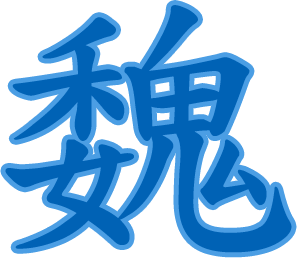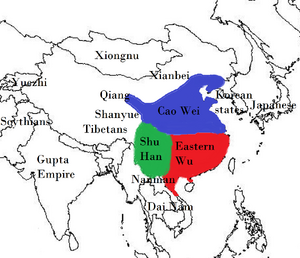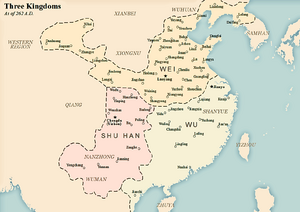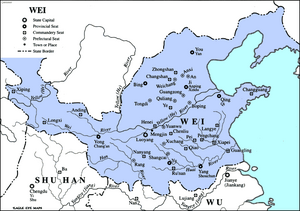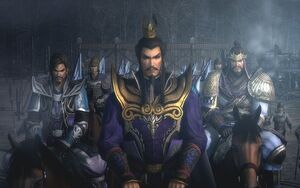(Adding categories) |
No edit summary |
||
| (34 intermediate revisions by 2 users not shown) | |||
| Line 1: | Line 1: | ||
{{Heroic Organization |
{{Heroic Organization |
||
| − | |image = |
+ | |image = Wei_TW3K.png |
|size = 200 |
|size = 200 |
||
|fullname = Cao Wei |
|fullname = Cao Wei |
||
| Line 12: | Line 12: | ||
|commanders = Cao Cao (posthumously)<br> |
|commanders = Cao Cao (posthumously)<br> |
||
[[Cao Pi]] (220 ~ 226 AD)<br> |
[[Cao Pi]] (220 ~ 226 AD)<br> |
||
| − | Cao Rui (226 ~ 239 AD)<br> |
+ | [[Cao Rui]] (226 ~ 239 AD)<br> |
Cao Fang (239 ~ 254 AD)<br> |
Cao Fang (239 ~ 254 AD)<br> |
||
Cao Mao (254 ~ 260 AD)<br> |
Cao Mao (254 ~ 260 AD)<br> |
||
Cao Huan (260 ~ 265 AD)<br> |
Cao Huan (260 ~ 265 AD)<br> |
||
| − | |agents = [[Xiahou Dun]]<br> |
+ | |agents = {{Scroll box|[[Xiahou Dun]]<br> |
[[Xiahou Yuan]]<br> |
[[Xiahou Yuan]]<br> |
||
Sima Yi<br> |
Sima Yi<br> |
||
Zhang Liao<br> |
Zhang Liao<br> |
||
Cao Ren<br> |
Cao Ren<br> |
||
| + | Dian Wei<br> |
||
| + | Xu Chu<br> |
||
Xu Huang<br> |
Xu Huang<br> |
||
Zhang He<br> |
Zhang He<br> |
||
| Line 33: | Line 35: | ||
[[Sima Shi]]<br> |
[[Sima Shi]]<br> |
||
[[Sima Zhao]]<br> |
[[Sima Zhao]]<br> |
||
| + | [[Deng Ai]]<br> |
||
[[Wang Yuanji]]<br> |
[[Wang Yuanji]]<br> |
||
| + | Jia Chong<br> |
||
| + | [[Guo Huai]]<br> |
||
| + | [[Zhuge Dan]]<br> |
||
Zhang Chunhua<br> |
Zhang Chunhua<br> |
||
| + | [[Zhong Hui]]<br> |
||
| + | [[Xin Xianying]]<br> |
||
[[Xun Yu]]<br> |
[[Xun Yu]]<br> |
||
[[Xun You]]<br> |
[[Xun You]]<br> |
||
[[Pang De]]<br> |
[[Pang De]]<br> |
||
| + | Cao Chun<br> |
||
| ⚫ | |||
| + | Cao Zhi<br> |
||
| + | Cao Shuang<br> |
||
| + | [[Cao Zhen]]<br> |
||
| + | [[Cao Zhang]]<br> |
||
| + | Cao Hong<br> |
||
| + | Wang Yi<br> |
||
| + | Wang Lang<br> |
||
| + | Wang Su<br> |
||
| + | Sima Lang<br> |
||
| + | Meng Da<br> |
||
| + | Niu Jin<br> |
||
| + | [[Zang Ba]]<br> |
||
| + | [[Wen Yang]]<br> |
||
| ⚫ | |||
|special abilities/weapons = High intelligence<br> |
|special abilities/weapons = High intelligence<br> |
||
Warrior skills<br> |
Warrior skills<br> |
||
| + | Charisma<br> |
||
| − | Combat proficiency<br> |
||
| + | Extensive combat experiences<br> |
||
| + | Great strategist and tactician<br> |
||
Swordsmanship<br> |
Swordsmanship<br> |
||
Leadership<br> |
Leadership<br> |
||
Poise<br> |
Poise<br> |
||
Political influence<br> |
Political influence<br> |
||
| + | Ambition<br> |
||
Agility<br> |
Agility<br> |
||
Weapons expertise |
Weapons expertise |
||
| Line 54: | Line 79: | ||
==History== |
==History== |
||
| − | Cao Cao was |
+ | Cao Cao was a military warlord of Yan Province, but he had conquered many times in his early years. He participated in the Han forces, such as the anti-Yellow Turbans and the alliance against Dong Zhuo, and also expanded his territory. After Han forces defeated Dong Zhuo in the Battle of Hulao Gate, Cao Cao is already controlled the central plain of China and had become a force worthy of being taken into account. In the meantime, Cao Cao could received the allegations of Emperor Xian at will. These expression was surely to carry on, he lead the armies to defeated both Lu Bu and Yuan Shu and conquer the whole territory. During the Battle of Guandu, Cao Cao would fight against his powerful opponent Yuan Shao when led the forces to took over the operations. At the Battle of Tong Pass, [[Ma Chao]] killed Cao Cao in order to avenge his family's death, Xu Chu decided to protect Cao Cao and stoped Ma Chao from being severely hindered. |
| − | After Cao Cao's death, and his second position was occupied by his second son [[Cao Pi]]. When Cao Pi founded the kingdom of Wei and dethroned Emperor Xian, thus |
+ | However, Cao Cao was appointed as King of Wei after conquering many regions and taking over effective power for himself. After Cao Cao's death, and his second position was occupied by his second son [[Cao Pi]]. When Cao Pi founded the kingdom of Wei and dethroned Emperor Xian, thus the end of Han dynasty and proclaiming himself as the emperor of Wei. Also, his throne was disputed immediately by [[Liu Bei]] of [[Shu Han]], followed by [[Sun Quan]] from [[Eastern Wu]]. After Cao Pi died of illness due to failing to invade Wu, thus his son [[Cao Rui]] was succeeded him. He had to cope with the invasions of [[Zhuge Liang]], but he left that to Sima Yi, who was becoming a rising star. Wei court was divided into two major factions at this time. One is the Cao family, which was dominated by [[Cao Zhen]] and [[Cao Xiu]] and the second is the new forces based on the Sima Yi family and the Jia Kui family. |
| + | After [[Xiahou Dun]] and [[Xiahou Yuan]] dies, Xiahou family's talent ability has declined and they gradually moved away from power. As a result, the Sima family was so powerful that the Xiahou family could not compete. Gongsun Yuan declared himself "King of Yan" after flirting with Eastern Wu for a period of time, while Sima Yi was sent to calm the uprising in Liaodong. It took a year for the sport, Sima Yi and Guanqiu Jian besieged him in Xiangping Castle, they were sent to attack Wei main camp and lured his troops. After defeating them, Cao Wei armies attacked Gongsun Yuan's castle. When Gongsun Yuan is tried to surrender, but Sima Yi told him that he ventured to believe that his uprising had a chance, which is not worth living for him. |
||
| ⚫ | Sima Yi and general Cao Shuang were appointed as his regents. Cao Shuang was cautious about Sima Yi's power and forced him to retire. Sima Yi pretended to be sick and pretended to be jealous. He retired from public life. Cao Shuang controlled the Wei government and planned the invasion of Shu |
||
| ⚫ | Sima Yi had Gongsun Yuan and his family were executed, Cao Wei resumed order on the Liaodong Peninsula. It gradually formed a serious confrontation and planting the seeds of Gaoping Tombs in the future. However, Sima Yi and general Cao Shuang were appointed as his regents. Cao Shuang was cautious about Sima Yi's power and forced him to retire. Sima Yi pretended to be sick and pretended to be jealous. He retired from public life. Cao Shuang controlled the Wei government and planned the invasion of Shu, Sima Yi finally decided to overthrow Cao Shuang. Sima Yi seized control of Luoyang from Cao Shuang's forces, Cao Shuang and Cao Fang paid tribute to the Gaoping tombs, which were the burial sites of the Wei emperors. |
||
| ⚫ | When Cao Mao tried to |
||
| + | |||
| ⚫ | When Cao Shuang and his main force returned, Sima Yi completely controlled the capital. After the occurrence of Incident at the Gaoping Tombs, Xiahou family was exiled to the border or surrendered to Shu. When Cao Mao is tried to recaptured [[Sima Zhao]]'s state power in the coup, but was killed by Cheng Ji, an officer serving under Jia Chong, a subordinate to the Simas. After Cao Mao dies, Cao Huan was appointed as the fifth ruler of Wei. However, under the control of Sima Zhao, Cao Huan is just a jealousy, much like his predecessor. After Wei defeated Shu Han, Wei was overthrown by Sima Yan, the grandson of Sima Yi as well as the new emperor. Sima Yan then founded the Jin Dynasty. Overall, there were five kings of Wei empire. |
||
==Gallery== |
==Gallery== |
||
| + | ===Images=== |
||
<gallery widths="300" bordercolor="blue" captiontextcolor="blue" position="center"> |
<gallery widths="300" bordercolor="blue" captiontextcolor="blue" position="center"> |
||
| − | + | Wei symbol lg.png|Wei symbol. |
|
| + | Wei character.jpg|Wei in ''Dynasty Warriors'' series. |
||
Beast_Icon_2_(DWO).png|Dynasty Warriors: Online beast symbol. |
Beast_Icon_2_(DWO).png|Dynasty Warriors: Online beast symbol. |
||
Three Kingdoms.png|The Three Kingdoms in 220 AD. |
Three Kingdoms.png|The Three Kingdoms in 220 AD. |
||
| + | DW-Wei.png|The territories of Cao Wei (in yellow), 262 AD. |
||
| + | Map_of_Wei.png|Map of Wei. |
||
Wei_Army.jpg|Wei generals Cao Cao, with Xu Zhu, Xiahou Dun, and Dian Wei behind him. |
Wei_Army.jpg|Wei generals Cao Cao, with Xu Zhu, Xiahou Dun, and Dian Wei behind him. |
||
| + | Cao_Cao_cousins.jpg|Cao Cao's cousins. |
||
| + | BS7X0bzCMAAikZ6.jpg|The 9 Wei warriors. |
||
| + | 146557-hi.jpg |
||
</gallery> |
</gallery> |
||
| Line 79: | Line 113: | ||
==Navigation== |
==Navigation== |
||
{{Romance of the Three Kingdoms Heroes}} |
{{Romance of the Three Kingdoms Heroes}} |
||
| ⚫ | |||
[[Category:Heroic Hegemony]] |
[[Category:Heroic Hegemony]] |
||
| ⚫ | |||
[[Category:Fallen]] |
[[Category:Fallen]] |
||
[[Category:Military]] |
[[Category:Military]] |
||
[[Category:Warriors]] |
[[Category:Warriors]] |
||
| ⚫ | |||
[[Category:Organizations]] |
[[Category:Organizations]] |
||
[[Category:Extremists]] |
[[Category:Extremists]] |
||
[[Category:Fictionalized]] |
[[Category:Fictionalized]] |
||
[[Category:Grey Zone]] |
[[Category:Grey Zone]] |
||
| − | [[Category: |
+ | [[Category:Antagonists]] |
| − | [[Category:False Antagonist]] |
||
[[Category:Redeemed Villains]] |
[[Category:Redeemed Villains]] |
||
[[Category:On & Off]] |
[[Category:On & Off]] |
||
| − | [[Category: |
+ | [[Category:Fighters]] |
| ⚫ | |||
[[Category:Video Game Heroes]] |
[[Category:Video Game Heroes]] |
||
[[Category:Crossover Heroes]] |
[[Category:Crossover Heroes]] |
||
| Line 107: | Line 140: | ||
[[Category:Freedom Fighters]] |
[[Category:Freedom Fighters]] |
||
[[Category:Heroic Disciplinarians]] |
[[Category:Heroic Disciplinarians]] |
||
| − | [[Category: |
+ | [[Category:Dissolved Organization]] |
[[Category:Successful]] |
[[Category:Successful]] |
||
[[Category:Benevolent Rulers]] |
[[Category:Benevolent Rulers]] |
||
| ⚫ | |||
[[Category:Monarchs]] |
[[Category:Monarchs]] |
||
| − | [[Category:Loner Heroes]] |
||
[[Category:Thrill-Seekers]] |
[[Category:Thrill-Seekers]] |
||
[[Category:Protector of Innocence]] |
[[Category:Protector of Innocence]] |
||
[[Category:Status dependent upon Player choice]] |
[[Category:Status dependent upon Player choice]] |
||
| − | [[Category:Forgivers]] |
||
[[Category:Wrathful]] |
[[Category:Wrathful]] |
||
[[Category:Lawful Neutral]] |
[[Category:Lawful Neutral]] |
||
| Line 124: | Line 154: | ||
[[Category:Lethal]] |
[[Category:Lethal]] |
||
[[Category:Anti Hero]] |
[[Category:Anti Hero]] |
||
| − | [[Category:Classic Heroes]] |
||
[[Category:Virtually Resourceful]] |
[[Category:Virtually Resourceful]] |
||
| − | [[Category:Destructive]] |
||
[[Category:Officials]] |
[[Category:Officials]] |
||
[[Category:Historical Heroes]] |
[[Category:Historical Heroes]] |
||
[[Category:War Heroes]] |
[[Category:War Heroes]] |
||
| − | [[Category:Normal Badass]] |
||
| − | [[Category:Pessimists Turned Optimists]] |
||
[[Category:Defectors]] |
[[Category:Defectors]] |
||
[[Category:Patriots]] |
[[Category:Patriots]] |
||
[[Category:Paragon]] |
[[Category:Paragon]] |
||
[[Category:Knights]] |
[[Category:Knights]] |
||
| ⚫ | |||
[[Category:Voice of Reason]] |
[[Category:Voice of Reason]] |
||
| − | [[Category:Victims]] |
||
[[Category:Martyr]] |
[[Category:Martyr]] |
||
[[Category:Friend of a Villain]] |
[[Category:Friend of a Villain]] |
||
| Line 143: | Line 169: | ||
[[Category:Heroic Liars]] |
[[Category:Heroic Liars]] |
||
[[Category:Mysterious]] |
[[Category:Mysterious]] |
||
| − | [[Category:Reactionary]] |
||
| − | [[Category:Supporters]] |
||
[[Category:Titular]] |
[[Category:Titular]] |
||
[[Category:Bond Protector]] |
[[Category:Bond Protector]] |
||
[[Category:Protectors]] |
[[Category:Protectors]] |
||
[[Category:Beat'em Up Heroes]] |
[[Category:Beat'em Up Heroes]] |
||
| − | [[Category:From Zero to Hero]] |
||
[[Category:Brutes]] |
[[Category:Brutes]] |
||
[[Category:Elementals]] |
[[Category:Elementals]] |
||
| − | [[Category: |
+ | [[Category:Nemesis]] |
Revision as of 01:02, 16 March 2020
Wei (in Chinese: 魏), also known as Cao Wei (in Chinese: 曹魏), are the antagonistic and an anti-heroic faction in the 14th-century Chinese classic novel Romance of the Three Kingdoms by the late Luo Guanzhong, and its multiple adaptations. They are one of the three influential kingdoms in China. In Dynasty Warriors and the most fictional media, the country is symbolized by the color blue and a Chinese phoenix.
History
Cao Cao was a military warlord of Yan Province, but he had conquered many times in his early years. He participated in the Han forces, such as the anti-Yellow Turbans and the alliance against Dong Zhuo, and also expanded his territory. After Han forces defeated Dong Zhuo in the Battle of Hulao Gate, Cao Cao is already controlled the central plain of China and had become a force worthy of being taken into account. In the meantime, Cao Cao could received the allegations of Emperor Xian at will. These expression was surely to carry on, he lead the armies to defeated both Lu Bu and Yuan Shu and conquer the whole territory. During the Battle of Guandu, Cao Cao would fight against his powerful opponent Yuan Shao when led the forces to took over the operations. At the Battle of Tong Pass, Ma Chao killed Cao Cao in order to avenge his family's death, Xu Chu decided to protect Cao Cao and stoped Ma Chao from being severely hindered.
However, Cao Cao was appointed as King of Wei after conquering many regions and taking over effective power for himself. After Cao Cao's death, and his second position was occupied by his second son Cao Pi. When Cao Pi founded the kingdom of Wei and dethroned Emperor Xian, thus the end of Han dynasty and proclaiming himself as the emperor of Wei. Also, his throne was disputed immediately by Liu Bei of Shu Han, followed by Sun Quan from Eastern Wu. After Cao Pi died of illness due to failing to invade Wu, thus his son Cao Rui was succeeded him. He had to cope with the invasions of Zhuge Liang, but he left that to Sima Yi, who was becoming a rising star. Wei court was divided into two major factions at this time. One is the Cao family, which was dominated by Cao Zhen and Cao Xiu and the second is the new forces based on the Sima Yi family and the Jia Kui family.
After Xiahou Dun and Xiahou Yuan dies, Xiahou family's talent ability has declined and they gradually moved away from power. As a result, the Sima family was so powerful that the Xiahou family could not compete. Gongsun Yuan declared himself "King of Yan" after flirting with Eastern Wu for a period of time, while Sima Yi was sent to calm the uprising in Liaodong. It took a year for the sport, Sima Yi and Guanqiu Jian besieged him in Xiangping Castle, they were sent to attack Wei main camp and lured his troops. After defeating them, Cao Wei armies attacked Gongsun Yuan's castle. When Gongsun Yuan is tried to surrender, but Sima Yi told him that he ventured to believe that his uprising had a chance, which is not worth living for him.
Sima Yi had Gongsun Yuan and his family were executed, Cao Wei resumed order on the Liaodong Peninsula. It gradually formed a serious confrontation and planting the seeds of Gaoping Tombs in the future. However, Sima Yi and general Cao Shuang were appointed as his regents. Cao Shuang was cautious about Sima Yi's power and forced him to retire. Sima Yi pretended to be sick and pretended to be jealous. He retired from public life. Cao Shuang controlled the Wei government and planned the invasion of Shu, Sima Yi finally decided to overthrow Cao Shuang. Sima Yi seized control of Luoyang from Cao Shuang's forces, Cao Shuang and Cao Fang paid tribute to the Gaoping tombs, which were the burial sites of the Wei emperors.
When Cao Shuang and his main force returned, Sima Yi completely controlled the capital. After the occurrence of Incident at the Gaoping Tombs, Xiahou family was exiled to the border or surrendered to Shu. When Cao Mao is tried to recaptured Sima Zhao's state power in the coup, but was killed by Cheng Ji, an officer serving under Jia Chong, a subordinate to the Simas. After Cao Mao dies, Cao Huan was appointed as the fifth ruler of Wei. However, under the control of Sima Zhao, Cao Huan is just a jealousy, much like his predecessor. After Wei defeated Shu Han, Wei was overthrown by Sima Yan, the grandson of Sima Yi as well as the new emperor. Sima Yan then founded the Jin Dynasty. Overall, there were five kings of Wei empire.
Gallery
Images
Trivia
- Wei also appears as one of the factions in the Knights of Valour game series.
- In Kessen II, their armies is symbolized by the color red.
See Also
| | ||
|
Cao Wei Eastern Wu Shu Han Jin Dynasty Han Dynasty Exclusive Characters Good Organizations | ||

